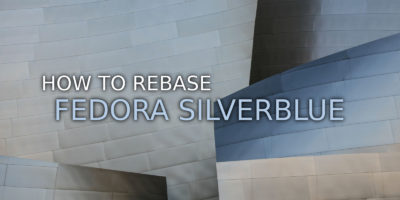Fedora 23 Beta
Of course, last week marked the release of Fedora 23 beta. So far, reports are good, and I’m really happy using it on my system. (I’ve heard at least one “even better than F22 final release”!) If you haven’t yet, check it out (making sure to scan the F23 Common Bugs page, which to my eye is comfortingly short — looks like we’re on good track for our Halloween release!
FUDCon LATAM reflections
I posted about FUDCon Cordoba a couple of weeks ago, and since that time, there’ve been a number of interesting posts about it on Fedora Planet, our community blog aggregator. Neville Cross asks What is FUDCon really about?, and María “tatica” Leandro writes about Building a better FUDCon experience. I found both of these very fascinating reading. We have great people in this region and a lot of opportunity for both user and contributor growth, and it’s exciting to see this discussion of how we can make FUDCon better serve that.
Puppet-driven collaboration
In this case, not the automation software, but an actual puppet, Mr. Lunduke, alter-ego of Linux community personality Bryan Lunduke (perhaps most famous for his regular “Linux Sucks” talk — which, spoiler alert, has the punchline that it mostly doesn’t suck). Anyway, the other day I was part of a panel discussion with Ubuntu Community Manager Michael Hall and openSUSE Board Chairman Richard Brown, talking about how these various Linux flavors collaborate and how we could do it better.
Updated proposal on “bundling”
Based on feedback from last month, Fedora Engineering Steering Committee (“FESCo” — Fedora’s all-elected technical leadership body) member Stephen Gallagher put forth a revised Proposal to reduce anti-bundling requirements. “Bundling” is what we call the practice of where software developers who need bits of supporting code (“libraries”) include a copy of that right in their own project. In some software development circles, this is known as “vendoring”. In others, like with Go, it’s “the thing you normally do to use those libraries”.
Traditionally, Fedora has not just frowned on it, but actively fought against it. That’s primarily because this can end up being a security nightmare — when a bug is found in some library, you have to track it down and update it everywhere. But, this practice has also caused us a lot of pain. It generates a lot of work up front, and many upstream software projects see it as actively detrimental — users get something very different from the software that they’ve tested. Mandatory unbundling increases the barrier to contributing toFedora, and being at odds with upstreams means it’s harder to scale up the Fedora package collection even as open source is increasingly the default for new software development. So, while that security story is a big benefit, we pay a high cost.
Stephen’s proposal aims to keep the benefits of unbundling for the “critical path” part of the distro, and relax it for the fringes — while keeping a strict policy of mandated labeling for bundling. (Matthias Clasen adds that to be really meaningful, this should be supported by automation, which I also agree with — if we put all the effort into building those tools that we spend on unbundling, we’d be in a much better place.)
Ansible for all Fedora Infrastructure
And, ending on another technical note: Kevin “Nirik” Fenzi writes that Fedora’s infrastructure team has completed a three-year migration from Puppet to Ansible for configuration management. This is worth mentioning as a milestone, but also an interesting quick read for anyone interested in topics around systems administration.






ifoolb
That’s not true for me. I have to switch back to 22 since 23 beta hangs on shutdown( but poweroff -f works), besides other visual issues. Maybe it’s caused by nouveau, or modem manager, or systemd… Googled around but I couldn’t either find an answer or determine it myself, so I just blame nVidia.
Sebastiaan Franken
That’s funny. I had the same issue with 22. A kernel update fixed it for me, and that was on my laptop with only a Intel GPU.
Matthew Miller
For shutdown problems in the beta, see https://lists.fedoraproject.org/pipermail/test/2015-October/128044.html. It’s related to the fix for a systemd issue which sometimes resulted in empty bash history.
Leslie Satenstein
Fedora23 without Wayland works for me just fine. I have not encountered problems.
The F23 Wayland support works for many programs (applications), but then again, a few are broken.
Wayland is a Gnome Issue, and thus, it is a Fedora issue.
Some F23 examples…. (Oct 4 /2015). Launch gparted in wayland terminal mode fails
Oct 3/2015 Defaulting to Gnome Wayland for logging into Fedora requires double submission of password.
Unmounting a mounted drive can’t be easily done without either having a tweak extension, or starting Nautilus, (files), clicking on “other”, and searching for the mounted parttion. (Carpal Tunnel aggrevation).
Two features to reduce everyone’s need to excessively click and excessive use of the mouse beg the following questons. .What happended to the ability to point the mouse to the icon on the display and right-click on the Gnome icon representing the mounted drive and choosing unmount? What happened to the option to bypass the trash bin via a right-click of the mouse button?
Atsuri
@Leslie
Problems with Wayland are bound to happen, because it’s still fairly new and cannot compete with the stability of traditional X server, which has been polished for decades. On the other hand, GNOME3 is extremely GUI-heavy, and as such is more susceptible to graphical and permission related bugs.
I believe things will change for the better and for instance my experience with F23 is definitely positive :).
Leslie Satenstein
Here is a conundrum. Nautilus with Fedora 21 (Prior to 3.18) was designed to be ergonomic, and to reduce the number of clicks of mouse buttons and keyboard entries. Especially since it now requires flipping from keyboard to mouse and back again, for what was once an all keyboard or all mouse activity.
The result (since I use Fedora 7 hrs per day with a pause for lunch), is carpal tunnel problems from excessive mouse button clicking.
I am willing to bet I am not alone with this painful problem.
Prior to version 22, I never had it.
On the plus side, other programs and features in version 23 beta appear well thought out.
For Fedora 22, two bugreports against Nautilus were raised. That was done for day -30 (beta for F22). Those bugs have not been addressed.
So the question to ask and to have answer is: Fedora, is it for end-users, or for Gnome, and end-users are collateral? End-users are just along for the ride.
By the way, I have been a devoted Fedora user since 2004. My perception is that “Never with previous versions have I experienced disregard for end-user requests or bug reports.”
Am I wrong?
hanishkvc
Hi,
Why on earth is the linux world moving away from a sane practice of avoiding duplicate and old versions of libraries in general (at same time providing support for existance of same where required, if one where to write/compile/install things oneself) into a world of unneeded dumb containers/otherwise with duplicate/old versions of libraries and programs.
Yes there could be some corner cases, where projects have not genuinely moved forward to newer version of library for breakage in api semantic usage at a massive level, which begs the question of whether the breakages caused by the libraries warranted in the first place or not and inturn whether 2 versions of the library requires to exist in the distro till the situation can be resolved in a sensible way. For all other cases it is just a matter of someone (I know not soo simple with open source products) putting the effort to move them to the new libraries, and which will eventually occur one way or the other, if the project in question is still active.
NOTE: I have may be used extreme superlatives in some cases to put the point across, but at a fundamental level, I don’t think it is much off mark.
Michael Marinovic
I like Fedora. I feel like the ability to learn linux and contribute to the open source projects is a good thing to move on. I am working on an economic modeling software but I have limited experience. I like tutorials and learning pages the most.